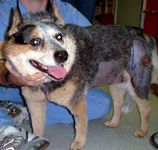NCSU harnesses new treatment for canine soft-tissue sarcoma
RALEIGH, N.C. - Hyperthermia combined with radiation treatment has received positive response in canines with macroscopic tumors in a clinical study at North Carolina State University (NCSU).
RALEIGH, N.C. — Hyperthermia combined with radiation treatment has received positive response in canines with macroscopic tumors in a clinical study at North Carolina State University (NCSU).

Shrinking mass:This tumor responded during the second week of treatment. Catheters
The College of Veterinary Medicine's (CVM) Oncology Service is comparing the efficacy of low-heat versus high-heat treatments on dogs with tumors sized 10cm3 -400cm3 volume.
"The biggest question is which is better for treatment," says Beth Case, oncology research assistant, NCSU. "The outcome of this research could have a huge impact on veterinary medicine as well as human medicine in the way these tumors are treated."
The level of heat and if it is administered at a slow rate versus higher is another question in the trial. Dogs receiving low, slow heat were treated multiple times a week, and dogs given a higher level of heat treatment were treated once a week.

Facilitate the fiber optic thermometry probes used during treatments. Heat and radiation during a 5-week period significantly reduces the tumor's size
The level of physiological changes of the tumors was measured with patients showing reduction in tumor size. Those receiving higher heat levels showed the most improvement, Case says.
Dogs eligible for the ongoing study must have a macroscopic tumor peripherally located with no bone invasion and are free of other major medical problems.
Multiple tumor biopsies will be taken and radiation treatment administered to all patient participants.
The trial is sponsored by the National Cancer Institute. The trial could result in the optimization of the use of hyperthermia for the treatment of animals and humans, university authorities say.
Other news at NCSU
Dr. Karen Munana, associate professor of neurology, is researching genetic clues in canine epilepsy, collaborating with Dr. Katrina Mealey of Washington State University.
A genetic mutation of the protein p-glycoprotein occurs in certain herding breeds that have epilepsy; researchers are hoping the protein can provide answers to why these dogs do not respond to treatment.
The protein pumps drugs out of the nervous system, which some herding breeds have a problem with.
Munana's goal is to determine what effects a deficiency in p-glycoprotein has on a dog's response to seizure medication.
Having a p-glycoprotein defect assures the breed will become more susceptible to the side effects of certain drugs, but might help reduce seizures by keeping more of the medicine in the nervous system.
A parallel human study showed the protein pumping too much medication out of the nervous system, rendering it useless, Munana says in a NCSU statement. The study at NCSU is ongoing.
Canine osteoarthritis/drugs
A clinical study is underway at NCSU's Comparative Pain Research and Small Animal Orthopedics department. The funded study hopes to help canines with osteoarthritis live more comfortably.
The university is currently looking for candidates for the study and promises the following:
- Evaluation by the Integrated Pain Management team,
- Complete blood count,
- Complete orthopedic and neurological evaluation,
- Complete biochemical profile and urine analysis,
- Radiographs of affected joints,
- Analgesia medication for 42 days.
All of the services listed will be provided at no cost to the owner. Veterinarians aware of qualified patients are encouraged to refer owners to Dr. B. Duncan Lascelles at the university.
Podcast CE: A Surgeon’s Perspective on Current Trends for the Management of Osteoarthritis, Part 1
May 17th 2024David L. Dycus, DVM, MS, CCRP, DACVS joins Adam Christman, DVM, MBA, to discuss a proactive approach to the diagnosis of osteoarthritis and the best tools for general practice.
Listen